- Home
- Tim LaHaye
The Rapture: Evil Advances / Before They Were Left Behind Page 2
The Rapture: Evil Advances / Before They Were Left Behind Read online
Page 2
He sat up, vigorously rubbed his eyes and face, and pressed the intercom button. “Gabriella?”
“Yes, sir. My apologies, but Mr. Fortunato is here and assures me you would want to be awakened.”
So it had happened. It was done.
Less than a minute later, Nicolae had dragged a wet comb through his hair and pulled on a luxurious robe. He padded to the elevator, which opened into his parlor and brought him face-to-face with his most trusted adviser.
Carpathia fought to suppress a smile. “Leon, what is it?”
“Israel is being obliterated as we speak.”
Nicolae clapped. “The Russians?” he said, as if guessing.
Fortunato nodded, smiling. “There’s evidence Libya and Ethiopia are cooperating.”
“Perfect. Dr. Rosenzweig knew exactly what I wanted and would not budge. Wonder what he is thinking now. Or whether he will ever think again. Hoarding his formula was a waste. No one could maximize the benefits as I can.”
Fortunato grimaced.
“What?” Nicolae said. He pointed to a divan. “Sit, my friend.”
Leon settled heavily onto the couch. “Don’t assume the Kremlin will bring you in on this, Nicolae. My sources tell me this offensive is as costly a single assault as they have ever attempted. The cadre I introduced you to will likely want to license you only a portion of the rights to market in certain areas.”
Nicolae sat across from Leon on a large ottoman. “And you have some illusion that this would be enough for me? Surely you are sporting.”
“I know how you feel, Nicolae; it simply may not be as easy as we’d like. Forgive me, chief, but why do you continue to grin like the Cheshire cat?”
A chuckle escaped Carpathia. “The deal has already been made, Leon.”
“Sorry?”
“You did not hear me or did not understand?”
“The latter, sir.”
“Between Jonathan Stonagal and me, we financed this operation and settled on terms before the first plane left the ground. Russia will have unlimited use of the formula for their entire expanse, as will Ethiopia and Libya, but the marketing of it throughout the rest of the world is under my purview, and they get an appropriate royalty. Seven percent.”
Leon shook his head and leaned back, squinting at Nicolae. “You can’t be serious.”
“Of course I am. I would not make light of billions of dollars. Would you like the privilege of informing Mr. Stonagal? It is just before seven in New York, and the old man will be on his treadmill.”
Leon sighed. “He’s the one who informed me.”
“But he did not tell you of the arrangement?”
Leon stood, jamming his hands into his pockets. “Neither of you did. My role has been clarified.”
“Oh, make no mistake about that, Leon. You know more than anyone in my orbit, but you do not need to know all—neither shall you ever. You will know what you need to know and when I feel you should know it. Understood?”
“As I said, my role has been clarified.”
Chunks of ice and hailstones as big as golf balls forced Buck to cover his head with his jacket as the earth shook and resounded, throwing him to the ground. Facedown in the freezing shards, he felt rain wash over him. Suddenly the only sound was the fire in the sky, and it began to fade as it drifted lower. After ten minutes of thunderous roaring, the fire dissipated, and scattered balls of flame flickered on the ground. The firelight disappeared as quickly as it had come. Stillness settled over the land.
As clouds of smoke wafted away on a gentle breeze, the night sky reappeared in its blue-blackness and stars shone peacefully as if nothing had gone awry.
Buck turned back to the building, his muddy leather jacket in his fist. The doorknob was still hot, and inside, military leaders wept and shuddered. The radio was alive with reports from Israeli pilots. They had not been able to get airborne in time to do anything but watch as the entire Russian air offensive seemed to destroy itself.
Miraculously, not one casualty was reported in all of Israel. Otherwise Buck might have believed some mysterious malfunction had caused missile and plane to destroy each other. But as he interviewed the shaken men and women who had monitored the thing on computer screens, they told another story.
A young female Israeli soldier, in heavily accented but precise English, told him, “It was a firestorm, along with rain and hail and an earthquake. That is what saved us from destruction.”
It was the story of a lifetime, and Buck quickly appropriated a jeep and raced throughout the country, interviewing leaders, civilians, soldiers. Dotting the landscape for as far as he drove were hundreds and thousands of chunks of burning, twisted, molten steel that had smashed to the ground in Haifa, Jerusalem, Tel Aviv, Jericho, even Bethlehem—leveling ancient walls but not so much as scratching one living creature.
That was beyond Buck’s comprehension; he simply could not make it compute.
As dawn broke several hours later, special task forces competed with buzzards and vultures for the flesh of the enemy dead, scrambling to bury them before their bones were picked clean and disease threatened the nation.
Buck was greatly relieved to find that Dr. Rosenzweig had escaped unscathed. “Had I not been here and seen it myself, I would not have believed it,” he told the scientist. “It will take more than I have in me to make my readers buy it either.”
Rosenzweig seemed strangely quiet.
“What is it, Doctor?” Buck said.
“Well, it is just that I feel strange broaching this subject, as an agnostic at best, but would you allow me to introduce you to some scholars who might have an interesting take on this?”
Rosenzweig introduced Buck to university professors who pointed out passages from the Bible that talked about God destroying Israel’s enemies with a firestorm, an earthquake, hail, and rain. Buck was stunned to read Ezekiel 38 and 39 about a great enemy from the north invading Israel with the help of Persia, Libya, and Ethiopia. More stark was that the Scriptures foretold of weapons of war used as fire fuel and enemy soldiers eaten by birds or buried in a common grave.
Buck wasn’t prepared to become religious, he told himself, but he certainly became a different person and a different journalist. Nothing would ever again be beyond his belief.
And if there was one person he wanted to talk to about all this, it was his Chicago colleague Lucinda Washington.
TWO
NICOLAE CARPATHIA sat behind the office desk at his estate in Bucharest, fully aware that steepling his fingers beneath his chin was a power cliché. Leon Fortunato squirmed in the chair across from him. Whether Leon had ever noticed that Carpathia’s chair sat on a platform an inch and a half above the floor, Nicolae could not tell. The perch allowed Carpathia to subtly tower over any guest.
Nicolae was amused that Leon had been out of sorts ever since getting the drift that he was not as close to Carpathia as he had clearly come to believe. Nicolae’s allowing his adviser to inform him of the Russian attack on Israel, then revealing that he himself had helped finance it, seemed to have crushed Fortunato’s spirit. And, naturally, that was the point.
Fortunato was an asset, but there was always value in keeping everybody in one’s orbit in their proper position. Leon could be useful but only if he knew and kept his place. The Roman was a strange combination of character traits. He could be obsequious yet also diplomatic. He was deferential but also sensitive to his station. Carpathia would have to start rebuilding the fragile ego while not softening the sting of the latest establishment of rank. Especially with the bizarre, otherworldly malfunction of the assault on Israel.
Oh, there were more millions where those lost on the operation had come from. But having come away from the fiasco without access to Chaim Rosenzweig’s precious fertilizer formula, Carpathia had come to a hard realization. Seething, he deduced that his promised place at the top of the world would not be established on a foundation of wealth.
No, it would have to be buil
t on diplomacy. Or what appeared to be diplomacy. In truth, his rise must be fueled by power.
“I have an assignment for you, my friend,” Nicolae began.
Leon tilted his head back slightly and pressed his lips together, touching the knot of his tie, then pulling from his pocket a tiny leather note-card holder. “At your service, sir.”
“You are troubled, Leon.”
The heavier, older man sighed and shifted in his seat. “I simply prefer no surprises.”
“Such as my part in the recent dustup in Israel.”
“Yours and Mr. Stonagal’s, yes, sir.”
Carpathia covered his face with his hands and rubbed his eyes. “We need to clarify Mr. Stonagal’s role as well, Leon.”
“Clarify?”
“You must know that while he was in on this with me and he chose not to inform you, that was at my request. In reality, he serves me as you do.”
“He serves you? Don’t his financial resources outweigh even—?”
“Mine, yes. But surely you must understand that he is, in essence, a supplier.”
Fortunato appeared genuinely surprised. “Is that so? I thought the new golden rule was that he—”
“—who has the gold makes the rules, yes. That is hardly novel or original, and the fact is, neither is it true. My wealth potential is unlimited, and I expect to have not just access to but also ownership of Stonagal’s fortune one day.”
“Indeed?”
“If you do not believe that, Leon, perhaps you would rather be working for him.”
Fortunato shook his head, and Carpathia saw sadness in his eyes. “Make no mistake, Nicolae. I have hitched my wagon to your star, and though you apparently don’t appreciate that, I am willing to prove myself to you.”
Carpathia studied the man. This couldn’t be working more perfectly. “You realize that this room—in fact the entire estate—is surveillance-proof.”
Leon appeared depressed. “Of course, sir. I oversaw that personally.”
“And so what we say here stays here.”
Leon nodded.
“Let us walk, shall we? And then plan to join me for dinner. What would you like?”
Nicolae rose and allowed Leon to help him don his jacket, then buzzed Viv Ivins and asked her to send their food order to the kitchen. When they arrived back, their meals would be served.
As they strolled the grounds of the rolling acreage that looked out over the vast Romanian capital, Nicolae was reminded of their first get-acquainted walk and how he had sensed king-making potential in the unprepossessing Italian with so many contacts.
At the highest point on the property, Nicolae suddenly stopped and turned to face Fortunato. Carpathia’s two primary bodyguards held back about fifty yards, and four others lingered at their posts farther away on all sides.
“I want to be the next president of the republic—”
“I know. I am putting together a team of—”
“—but I have decided I do not want to wait for the next election.”
“I don’t understand.”
“Of course you do, Leon. You once told me, on these very grounds, that you would do anything I asked, even to the ultimate degree.”
Fortunato raised his eyebrows. “Surely you’re not suggesting—”
“I am not suggesting anything. I am telling you that I want Vasile out and me in. Can you or can you not get that done?”
“I will do my best.”
“Your best had better be success.”
“You will have my whole heart, sir, but understand—I assumed you would campaign and be elected in the traditional way, and I fully expected you to win in a landslide.”
Nicolae sat gingerly on an outcropping of rock and put his elbows on his knees, resting his chin in his hands. “That whole idea bores me, and it would take too long. The time is now.”
“There is the matter of protocol, the law, the succession format.”
“I am not interested in the obstacles, Leon. I am interested only in the outcome.”
“Gheorghe Vasile is a proud man, Nicolae. He will not surrender easily.”
“I do not care how easily he goes. I merely want this to be his idea, with his blessing, his urging of the government and the people to not only accept it but also ratify it.”
“But how?”
Carpathia looked knowingly at Fortunato. “Do I have to do everything? You want me to plot this and effect it?”
“No, I—it’s just that I—”
“You are so enamored of Stonagal; do you realize Jonathan holds the paper on Vasile’s businesses?”
“Well, that’s fortunate and could be strategic, but—”
“Could be? The man gets a kickback on billions of dollars worth of government contracts, and he gets them now. Every weapon of war, for instance, translates to a colossal boon to his secret bank accounts.”
“But surely his business ventures are in trusts as long as he’s in office.”
“Oh, Leon! Do you really believe President Vasile would surrender access to his entire avere—his fortune—to live on the government stipend?”
“Well, I—”
“Of course he would not and he has not and does not,” Nicolae said. “The man is guilty of not just political scandal but also crimes against his own people.”
“If what you say is true, we could virtually blackmail him into stepping down. Ruin him. Make him destitute. Or threaten to.”
Nicolae nodded slowly. “If necessary. But it must not actually come to that. I do not want to assume the power of a deposed ruler. For one thing, it would be more difficult to skirt the system. I am telling you that this must come from him, be his idea. I must reluctantly assume the role with his full endorsement as well as that of the government and the people.”
“No small order, sir.”
“You longed for a significant assignment. There it is.”
Irene Steele had made the difficult decision and pulled the trigger. With her husband attending church with her less and less and her spiritually reprobate daughter off at Stanford, Irene had switched churches, taking son Raymie with her. How rich it was to sit under the teaching and preaching of the avuncular Vernon Billings at New Hope Village Church. And to see her dear friend Jackie every Sunday. And how Raymie loved everything about church.
That, she knew, bothered Rayford. He attended church no more than once every two months and slept in or golfed most Sunday mornings, then seemed to want to make up for it by urging Raymie to watch sports on television with him when he got home. The boy seemed to acquiesce reluctantly, and Rayford confided his misgivings to Irene.
“He doesn’t have to be a jock,” he said. “But does he have to turn every ball game into an opportunity to preach at me? If I wanted to know what he learned in Sunday school or church, I’d go.”
Irene held her tongue, which wasn’t easy. Not that long ago she would have immediately told him he ought to go. He had fallen wholly out of the habit, and the last time he had shown up on a Sunday morning was the previous Christmas, when Raymie had played a bathrobed shepherd in the children’s drama. Rayford drove separately and slipped out as soon as Raymie’s part was over.
Irene had been tempted to rail against him, to demand to know who he thought he was . . . to ask him what he was so afraid of. But she was learning. Slowly, painfully, she was learning.
Jackie had urged her to go to the pastor for counseling about Rayford, and Reverend Billings had brought his own wife into the sessions—partly for appearances but also for her input. They had persuaded Irene that her best hope for Rayford was to stop nagging him. But Jackie’s own story of how she loved her husband into the faith was most powerful to Irene. That, she told the Billingses, was one reason she had to counter their suggestion that she try to get Rayford to come for counseling too.
“He’s just too far from this yet,” she said. “It’s as if we have an unspoken truce. I will not keep pushing him to attend church, and he will not dispara
ge me for switching to New Hope.”
Irene’s new resolve was not easy. She had fallen into a habit of seemingly passive comments, and it didn’t seem natural for her to put up with Rayford’s lame excuses. Her last volley stuck in her brain and shamed her. He had said something about how he really wanted to go, but he was so tired and overworked that he really needed the break.
“As if sitting in a pew for a brief part of the morning is more taxing than eighteen holes of golf,” she had said.
To his credit, he had simply fallen silent and left in a huff. She could be grateful for that.
When she arrived home from a convicting sermon, she and Raymie having picked up their traditional fast-food lunch on the way, Irene could hardly wait for Rayford to return from his golf outing. But when he got there, she nearly overwhelmed him.
No surprise to her, he was cautious and quiet, now wanting to just relax and watch TV. She wanted him to spend time with Raymie, of course, but she had to begin strong with this new effort to simply love and accept him. “How’d you shoot today?” she said, embracing him and clearly surprising him.
“Same old same old,” he said. “Looked like a pro on a couple of holes. Made everybody else look better on the rest.”
“Oh, I know you’re better than that,” she said. “I’ll bet you shot the lowest score.”
He looked embarrassed. “Actually, Jack won today, but I was second by only a stroke.”
“See? If you had more time to play, you’d beat him regularly.”
“That’s what I was thinking.”
When he went to raid the pantry for snacks, Irene said, “I’ll get that for you, hon.”
Again he looked suspicious. She went so far as to suggest he have a Coke, because she would rather he not drink in front of Raymie, and she had smelled alcohol on his breath.
He hesitated, as if he wanted to suggest a beer or something stronger, but he acceded and she set him up with chips and dip too.
“Four-wheeling today?” Raymie said as he ran through the house.

 Glorious Appearing: The End of Days
Glorious Appearing: The End of Days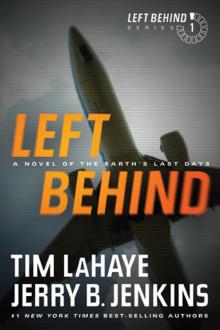 Left Behind: A Novel of the Earth's Last Days
Left Behind: A Novel of the Earth's Last Days Kingdom Come: The Final Victory
Kingdom Come: The Final Victory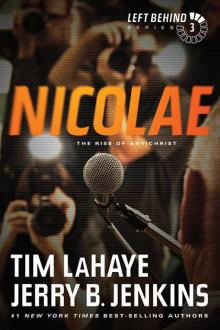 Nicolae: The Rise of Antichrist
Nicolae: The Rise of Antichrist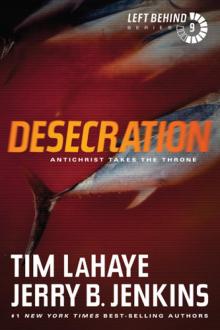 Desecration: Antichrist Takes the Throne
Desecration: Antichrist Takes the Throne Mark's Story: The Gospel According to Peter
Mark's Story: The Gospel According to Peter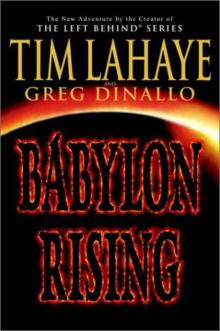 Babylon Rising
Babylon Rising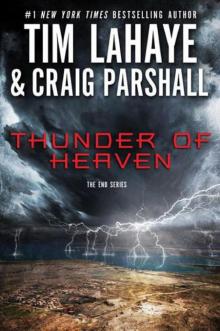 Thunder of Heaven: A Joshua Jordan Novel
Thunder of Heaven: A Joshua Jordan Novel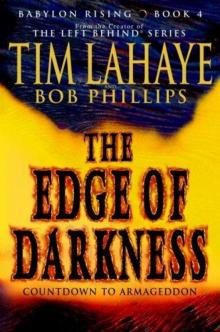 The Edge of Darkness
The Edge of Darkness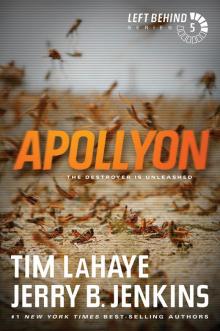 Apollyon: The Destroyer Is Unleashed
Apollyon: The Destroyer Is Unleashed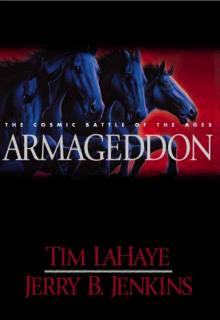 Armageddon: The Cosmic Battle of the Ages
Armageddon: The Cosmic Battle of the Ages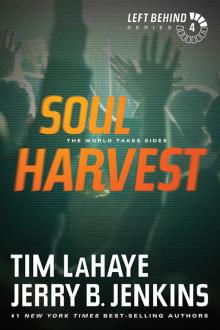 Soul Harvest: The World Takes Sides
Soul Harvest: The World Takes Sides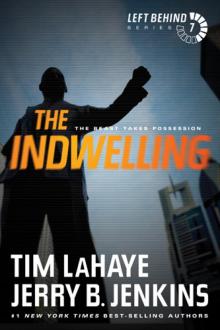 The Indwelling: The Beast Takes Possession
The Indwelling: The Beast Takes Possession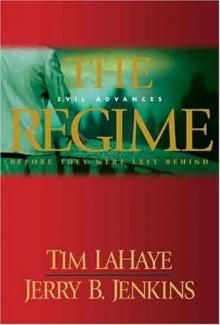 The Regime: Evil Advances
The Regime: Evil Advances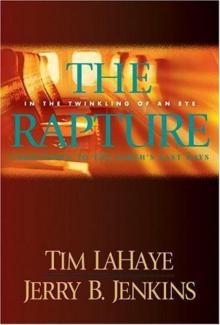 The Rapture: In the Twinkling of an Eye / Countdown to the Earth's Last Days
The Rapture: In the Twinkling of an Eye / Countdown to the Earth's Last Days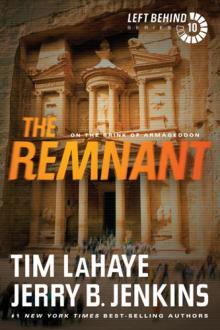 The Remnant: On the Brink of Armageddon
The Remnant: On the Brink of Armageddon John's Story: The Last Eyewitness
John's Story: The Last Eyewitness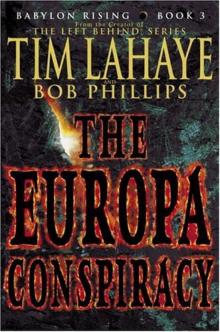 The Europa Conspiracy
The Europa Conspiracy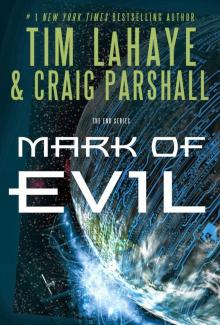 Mark of Evil
Mark of Evil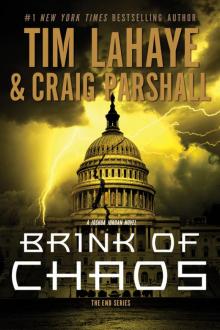 Brink of Chaos
Brink of Chaos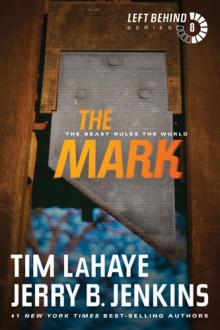 The Mark: The Beast Rules the World
The Mark: The Beast Rules the World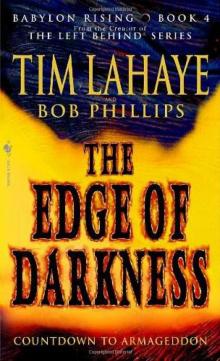 04 The Edge of Darkness
04 The Edge of Darkness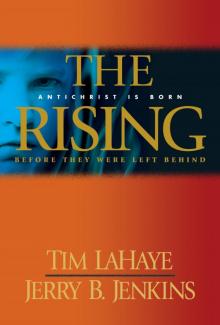 The Rising: Antichrist is Born / Before They Were Left Behind
The Rising: Antichrist is Born / Before They Were Left Behind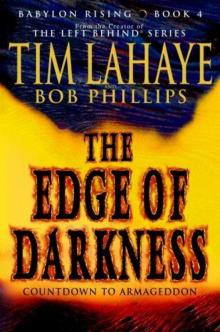 Babylon Rising: The Edge of Darkness
Babylon Rising: The Edge of Darkness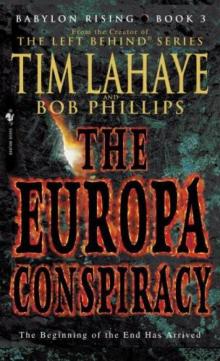 03 The Europa Conspiracy
03 The Europa Conspiracy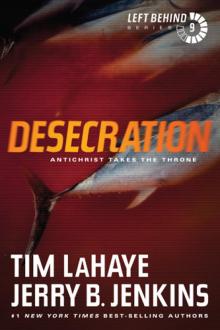 Desecration
Desecration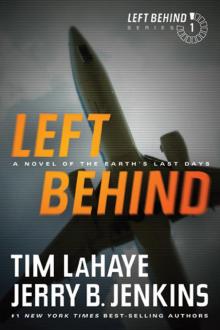 Left Behind
Left Behind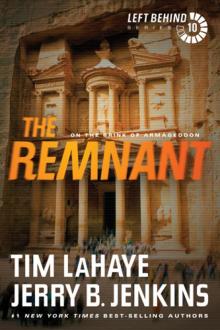 The Remnant
The Remnant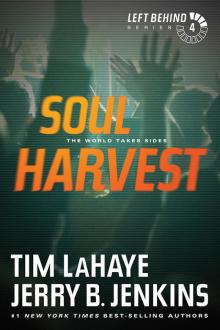 Soul Harvest
Soul Harvest Left Behind Book 13: Kingdom Come The Final Victory
Left Behind Book 13: Kingdom Come The Final Victory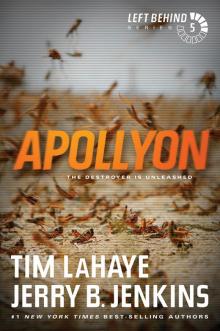 Apollyon
Apollyon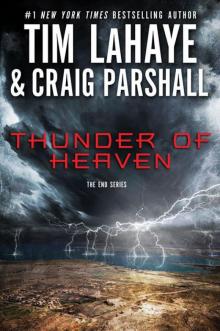 02 Thunder of Heaven: A Joshua Jordan Novel
02 Thunder of Heaven: A Joshua Jordan Novel Glorious Appearing
Glorious Appearing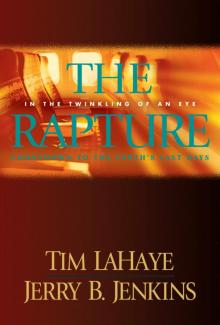 The Rapture: Evil Advances / Before They Were Left Behind
The Rapture: Evil Advances / Before They Were Left Behind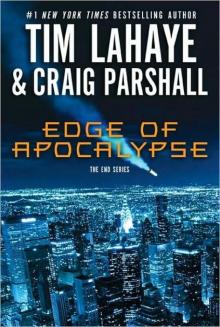 Edge of Apocalypse
Edge of Apocalypse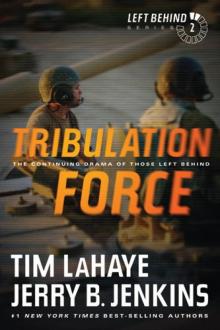 Tribulation Force
Tribulation Force The Left Behind Collection: All 12 Books
The Left Behind Collection: All 12 Books Black Friday
Black Friday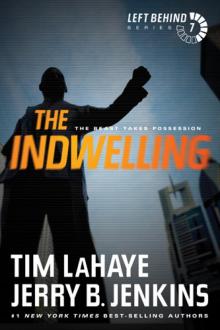 The Indwelling
The Indwelling The Left Behind Collection
The Left Behind Collection